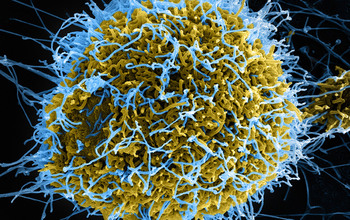News Release 14-162
Ebola rapid response
NSF grants first awards to diverse projects
December 3, 2014
This material is available primarily for archival purposes. Telephone numbers or other contact information may be out of date; please see current contact information at media contacts.
The National Science Foundation (NSF) has awarded the first of a number of rapid response grants to advance fundamental Ebola research.
The grants will support researchers seeking to answer important questions about the virus's fundamental nature, how it interacts with other substances, how it spreads, and how communication and perception affect public safety during an epidemic.
"We received innovative ideas from researchers across the spectrum of scientific disciplines," said NSF Director France Córdova. "These newly awarded projects will help to expand our knowledge of the virus as well as the associated complex social and behavioral aspects of a disease outbreak. This knowledge could lead to practical applications to safeguard our society from this and future threats."
NSF rapid response grants last one year, and individual award size varies according to project size and scope. The funding mechanism is intended for research with an urgent need--as is the case with the widespread Ebola outbreak--and is often used for environmental disasters.
Many Ebola rapid response grants are multidisciplinary and funded by more than one of NSF's seven research and education directorates.
In October, as part of a U.S. government-wide effort to protect against the virus, NSF invited research proposals that might allow scientists to better understand it.
Since then, in-house subject matter experts with diverse backgrounds--from infectious disease to social science to environmental engineering--have worked collaboratively with other federal agencies to coordinate proposals and to expedite funding for new Ebola research.
General topics covered by the NSF-funded projects include:
- New methods of virus detection.
- Modeling and computation of how the pathogen behaves in different environments.
- Development of new biomanufacturing processes for treatments.
- Learning the length of time the virus persists on various surfaces.
- Effective methods for disinfecting contaminated surfaces.
- Use of robots in medical response and humanitarian relief.
- Risk assessment and behavior.
The new awards are an extension of NSF's continuing investments in interdisciplinary, discovery-driven research, which have led to Ebola-related insights. Following the October call for proposals, the research community's response was immediate.
"Thanks to the lines of communication maintained via our programs and the standards set by NSF's merit review system, the community was poised to provide valuable guidance on how to best tackle this challenge," Córdova said.
Moreover, many of the projects also fall within research priority areas identified by leading U.S. public health officials at a recent workshop, as summarized in a recent report by The National Academies.
Project titles and abstracts are available in the NSF awards database as awards are finalized.
-NSF-
Media Contacts
Sarah Bates, NSF, (703) 292-7738, email: sabates@nsf.gov
Program Contacts
Samuel M. Scheiner, NSF, (703) 292-7175, email: sscheine@nsf.gov
William J Cooper, NSF, (703) 292-5356, email: wjcooper@nsf.gov
Rosemarie Wesson, NSF, (703) 292-7070, email: rwesson@nsf.gov
William Olbricht, NSF, (703) 292-2563, email: wolbrich@nsf.gov
Keith Roper, NSF, (703) 292-8769, email: kroper@nsf.gov
Theresa Good, NSF, (703) 292-2450, email: tgood@nsf.gov
Arcady Mushegian, NSF, (703) 292-8528, email: amushegi@nsf.gov
Michael Steuerwalt, NSF, (703) 292-4860, email: msteuerw@nsf.gov
Mary Ann Horn, NSF, (703) 292-4879, email: mhorn@nsf.gov
Rosemary Anne Renaut, NSF, (703) 292-2112, email: rrenaut@nsf.gov
Sylvia Spengler, NSF, (703) 292-8930, email: sspengle@nsf.gov
Deborah Winslow, NSF, (703) 292-7315, email: dwinslow@nsf.gov
Kurtis Haro, NSF, (703) 292-8425, email: kharo@nsf.gov
Rajakkannu Mutharasan, NSF, (703) 292-4608, email: rmuthara@nsf.gov
Elizabeth E. Lyons, NSF, (703) 292-8710, email: elyons@nsf.gov
Anthony Kelly, NSF, (703) 292-7998, email: akelly@nsf.gov
Related Websites
The administration’s response to Ebola: http://www.whitehouse.gov/ebola-response
NSF invites proposals for Ebola-related fundamental research: http://www.nsf.gov/news/news_summ.jsp?cntn_id=133052
The U.S. National Science Foundation propels the nation forward by advancing fundamental research in all fields of science and engineering. NSF supports research and people by providing facilities, instruments and funding to support their ingenuity and sustain the U.S. as a global leader in research and innovation. With a fiscal year 2023 budget of $9.5 billion, NSF funds reach all 50 states through grants to nearly 2,000 colleges, universities and institutions. Each year, NSF receives more than 40,000 competitive proposals and makes about 11,000 new awards. Those awards include support for cooperative research with industry, Arctic and Antarctic research and operations, and U.S. participation in international scientific efforts.
Connect with us online
NSF website: nsf.gov
NSF News: nsf.gov/news
For News Media: nsf.gov/news/newsroom
Statistics: nsf.gov/statistics/
Awards database: nsf.gov/awardsearch/
Follow us on social
Twitter: twitter.com/NSF
Facebook: facebook.com/US.NSF
Instagram: instagram.com/nsfgov



